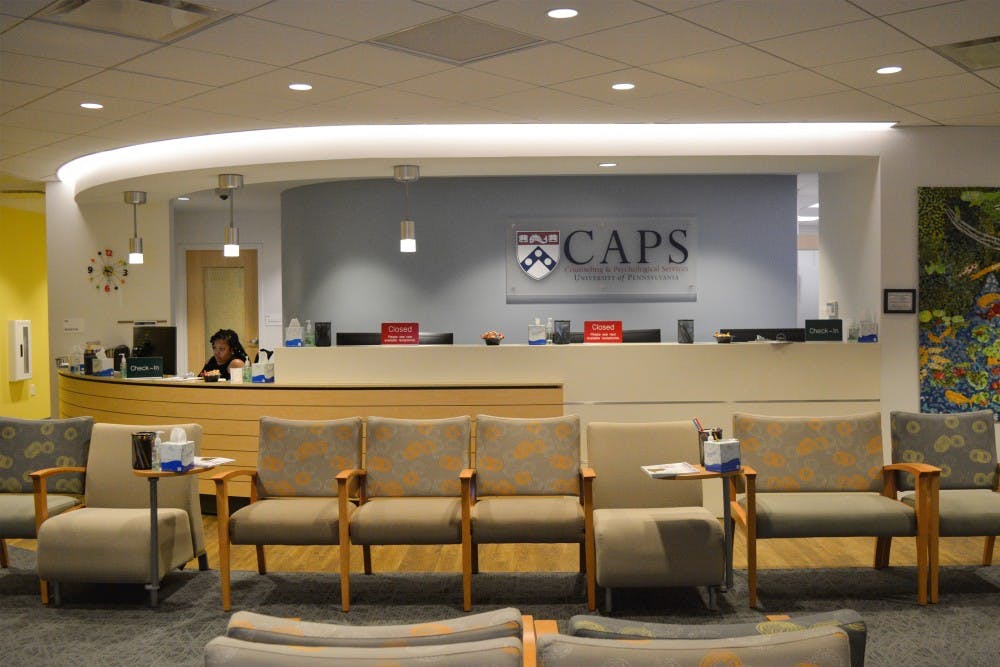
During the nine-month search for a new Counseling and Psychological Services executive director, several Penn student leaders were closely involved in the hiring and evaluation process for the position's final candidates.
Leaders from the Undergraduate Assembly, Graduate and Professional Student Assembly, and Penn Wellness interviewed several final candidates, including Gregory Eells, who was the executive director of Cornell University's Counseling and Psychological Services for more than 15 years. Eells will assume the position in March, replacing CAPS Deputy Executive Director Meeta Kumar.
UA President and College senior Michael Krone was one of the handful of students who led an interview for all final candidates. Krone said he and other students in the room asked Eells about the programs he piloted at Cornell, how he saw those programs change over the course of his tenure, and his plans to expand the CAPS resources at Penn.
Under Eells' leadership, the Cornell CAPS office prioritized hiring diverse staff and hiring more counselors to decrease wait times for appointments.
"He and the other candidates all demonstrated that they would do a really good job within this role," Krone said. "But I think the benefit that Dr. Eells had was that he was able to bring perspective from a peer institution that has also contended with wellness issues in a similar way that Penn has had."
Eells has also met with members of multiple student organizations, including GAPSA, Penn Wellness, and the Penn Benjamins peer counseling group. In late January, Eells attended an informal dinner with members of Penn Benjamins. He also participated in a GAPSA general assembly meeting, where students asked him questions, reported concerns, and offered suggestions, GAPSA President and doctoral candidate Haley Pilgrim said.
Eells, a veteran psychologist, was appointed as CAPS director on Jan. 11. He has directed CAPS at Cornell University since 2003. Before Kumar assumed her temporary position last September, CAPS had been operating without a director after Bill Alexander, who headed the office for nine years, retired in August 2018.
It is typical for the administration to include student representatives in the hiring process of “student-facing, leadership positions," Chief Wellness Officer Benoit Dubé wrote in an emailed statement to The Daily Pennsylvanian.
A few days after his hiring was announced, Eells said that while he was not yet familiar with mental health issues specific to Penn’s campus, there are certain challenges which are common to colleges across the country.
“I can’t speak specifically to the CAPS operation [at Penn] until I get to know the people and really delve in there, but I know they are confronting the same issues we are confronting here [at Cornell] and everyone else is confronting, which is how do we provide a level of care to meet the student demand for services,” Eells said.

An undergraduate psychology major, Eells went on to pursue a master's degree in clinical psychology at Eastern Illinois University, where he experienced working at the county's mental health clinic doing crisis intervention work.
"That's when I really started enjoying therapy and seeing how you can make a difference in people's lives," Eells said. "When I was doing the work on crisis intervention and working with suicidal people, I felt like the work was really meaningful."
Eells first began working with college students at Oklahoma State University, where he received his Ph.D. in counseling psychology.
"Working with college students, I really began to see how working with people in that stage in their lives can really make a difference," he added.
Eells' work with college students began at Cornell. A large Ivy League institution with a total of over 23,600 enrolled students, Cornell has faced many of the same issues that Penn has also struggled with.
Over the span of the 2009 to 2010 academic year, six students at Cornell died by suicide, prompting the University to install safety nets over the bridges where these students jumped off. At Penn, fourteen students have died by suicide since February 2013.
Eells also sat at the helm of CAPS when the University maintained that "Cornell is not a suicide school."
In a presentation to the Cornell Student Assembly in January 2018, Eells pointed out challenges Cornell has experienced, such as long wait times for CAPS appointments and the need to meet the increased demand of services from students, which Penn has recently also worked to address.
When Eells begins in March, his first line of focus will be understanding the Penn community.
"When I come to campus, I want to get to know the people,” he said. “It’s really about building relationships and what I’ve learned in 25 years as a psychologist is you can’t rush that. You have to trust the process of building the relationships and that’s my goal to do that with staff, students, and getting to know the Penn community.”
The Daily Pennsylvanian is an independent, student-run newspaper. Please consider making a donation to support the coverage that shapes the University. Your generosity ensures a future of strong journalism at Penn.
Donate







